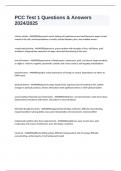PCC Test 1 Questions & Answers
2024/2025
risk for suicide - ANSWERSdepressed mood; feelings of hopelessness and worthlessness; anger turned
inward in the self; misinterpretations of reality; suicidal ideation, plan, and available means
complicated grieving - ANSWERSdepression, preoccupation with thoughts of loss, self-blame, grief
avoidance, inappropriate expression of anger, decreased functioning in life roles
low self-esteem - ANSWERSexpressions of helplessness, uselessness, guilt, and shame; hypersensitivity
to slight or criticism; negative, pessimistic outlook; lack of eye contact; self-negating verbalizations
powerlessness - ANSWERSapathy, verbal expressions of having no control, dependence on others to
fulfill needs
spiritual distress - ANSWERSexpresses anger toward God, expresses lack of meaning in life, sudden
changes in spiritual practices, refuses interactions with significant others or with spiritual leaders
social isolation/impaired social interaction - ANSWERSwithdrawn, uncommunicative, seeks to be alone,
dysfunctional interaction with others, discomfort in social situations
disturbed though processes - ANSWERSinappropriate thinking, confusion, difficulty concentrating,
impaired problem-solving ability, inaccurate interpretation of environment, memory deficit
imbalanced nutrition (less than requirements) - ANSWERSweight loss, poor muscle tone, pale
conjunctiva and mucous membranes, poor skin turgor, weakness
insomnia - ANSWERSdifficulty falling asleep, difficulty staying asleep, lack of energy, difficulty
concentrating, verbal reports of not feeling well rested
, self-care deficit (hygiene, grooming) - ANSWERSuncombed hair, disheveled clothing, offensive body odor
C. risk for suicide - ANSWERSMargaret, age 68, is a widow of 6 months. Since her husband died, her
sister reports that Margaret has become socially withdrawn, has lost weight, and does little more each
day than visit the cemetery where her husband was buried. She told her sister today that she "didn't
have anything more to live for." She has been hospitalized with MDD. The PRIORITY nursing diagnosis for
Margaret would be
A. imbalanced nutrition (less than requirements)
B. complicated grieving
C. risk for suicide
D. social isolation
B. "Sometimes it takes a few weeks for the medicine to bring about an improvement of symptoms." -
ANSWERSthe physician orders setraline (Zoloft) 50 mg PO bid for Margaret, a 68-year-old woman with
MDD. After 3 days of taking the medication, Margaret says to the nurse, "I don't think this medicine is
doing any good. I don't feel any better." What is the most appropriate response by the nurse?
A. "Cheer up, Margaret. You have so much to be happy about."
B. "Sometimes it takes a few weeks for the medicine to bring about an improvement of symptoms."
C. "I'll report that the the physician, Margaret. Maybe he will order something different."
D. "Try not to dwell on your symptoms, Margaret. Why don't you join the others down in the dayroom?"
A. identify and change dysfunctional patterns of thinking - ANSWERSThe goal of cognitive therapy with
depressed clients is to
A. identify and change dysfunctional patterns of thinking
B. resolve the symptoms and initiate or restore adaptive family functioning
C. alter the neurotransmitters that are creating the depressed mood
D. provide feedback from peers who are having similar experiences




